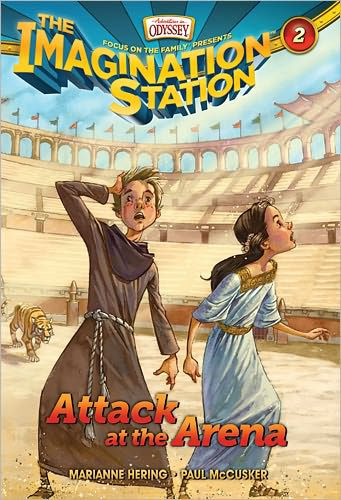Mr. Whittaker finds a mysterious letter inside the Imagination Station. The letter leads Patrick and Beth to fifth-century Rome on a quest to find a special cup that belongs to a monk. The cousins jump back in time and end up at the Roman Colosseum.
Before long, Beth and Patrick are separated. Patrick meets Telemachus, a monk, who believes fighting is wrong. Telemachus wants the emperor to end the gladiator battles. Telemachus guides Patrick as he looks for his cousin.
Meanwhile, Beth is mistaken as a slave and is sent to serve in the emperor’s palace. As the Emperor’s servant, Beth must attend Emperor Honorius’s gladiator battle. Patrick also attends as a monk’s apprentice but is captured and sent to fight in the arena. Will Patrick be able to survive?
History is incorporated into the story through Telemachus, Emperor Honorius, and the arena fighting. The story describes the horrors of the arena fighting in child-friendly terms and leaves out graphic violence. After reading the story, many may want to know more about ancient Rome.
Attack at the Arena has a fast-paced, action-packed plot with a strong message of faith. Since lessons in faith are delivered through the monk Telemachus, the lessons do not come across as preachy. Instead, readers will see how Telemachus lives his faith. Through Telemachus’s actions, the reader will learn that, “Greater love has no one than this, that he lay down his life for a friend.”
Readers who enjoy The Magic Tree House will want to add Attack at the Arena to their reading list. Both series have likable characters, mystery, and time travel. However, Attack at the Arena teaches how God can change people. This book is the second installment of The Imagination Station Series; as each book builds on the previous story, readers should read Voyage with the Vikings first. The interesting plot will keep readers turning the page until the very last page.
Sexual Content
- None
Violence
- When Patrick and Beth go back in time, they land in an arena with a tiger. The tiger “crouched down like a cat searching for a mouse. Its eyes burned bright. It ran straight toward Patrick.” Someone uses a whip to scare the tiger away.
- A soldier sees Beth and “picked her up and threw her over his shoulder.” He takes her to the palace to work as a slave.
- A soldier thinks Patrick is trying to help Beth escape. The soldiers “grabbed his arms. They roughly pulled him back.” One of the soldiers “pulled out a shiny sword. . . He pointed the sword at Patrick.”
- A man hears soldiers coming to capture him. When the monk tells the man to hide, the man instead “pulled the knife out of his belt. He pointed it at Telemachus (the monk).” The man steals a chalice and then flees.
- A soldier thinks Patrick is trying to help Beth escape again. He “picked him up and threw him into a wood cart. . . Patrick fell onto the bottom of the cart. His face was in the mud and straw.” Patrick is taken to the arena.
- At the arena, “Slaves fought the wild creatures. The men screamed and ran when the animals attacked.”
- Patrick and other prisoners are forced to fight in the arena. At the emperor’s signal, “prisoners began to fight each other. Each man battled for his life. An old prisoner quickly knocked Patrick’s knife out of his hand.”
Drugs and Alcohol
- None
Language
- None
Supernatural
- Mr. Whittaker has an Imagination Station that allows Beth and Patrick to travel back in time. When they get into the Imagination Station, “the machine jerked forward. Patrick felt as if he were on the subway. . . The machine whirled. Suddenly, everything went black.”
- Mr. Whittaker also has a ring that “you can only see it when my hand is in the machine.”
Spiritual Content
- The monk tells a soldier, “All children belong to God.”
- The monk tells Patrick, “God may let you find your friend later.”
- The monk tells Patrick that he is in Rome because “God told me to come here.” The monk didn’t know why God wanted him in Rome, but “it is for me to obey and go.” Later, the monk goes to the arena for the same reason. The monk says that God told him to go, “in my prayers this morning.”
- The monk tells Patrick, “there are no what ifs? with God. When He speaks, we’re to listen and obey.”
- The emperor, Honorius, says he is Christian and that “by law the emperor must be a Christian.”
- The monk tells the people watching the fighting, “In the name of Jesus who shed His blood for us. . . don’t take pleasure in the bloodshed! Stop—in the name of Christ—stop!”










